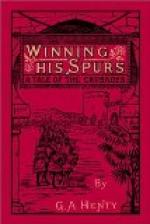Cuthbert’s heart had not fallen for a moment. He knew well that if he once reached Cairo all hope of escape was at an end; and it was before reaching that point that he determined if possible to make an effort for freedom. He had noticed particularly the camel which appeared to be the fleetest of the band; it was of lighter build than the rest, and it was with difficulty that its rider had compelled it to accommodate itself to the pace of the others. It was clear from the pains he took with it, by the constant patting and the care bestowed upon its watering and feeding, that its rider was extremely proud of it; and Cuthbert concluded that if an escape was to be made, this was the animal on which he must accomplish it.
Upon arriving at the end of each day’s journey the camels were allowed to browse at will, a short cord being tied between one of their hind and one of their fore feet. The Arabs then set to work to collect sticks and to make a fire—not for cooking, for their only food was dried dates and some black bread, which they brought with them—but for warmth, as the nights were damp and somewhat chilly, as they sat round the fire, talked, and told stories. Before finally going off to rest, each went out into the bushes and brought in his camel; these were then arranged in a circle around the Arabs, one of the latter being mounted as sentry to prevent any sudden surprise—not indeed that they had the smallest fear of the Christians, who were far distant; but then, as now, the Arabs of the desert were a plundering race, and were ever ready to drive off each other’s camels or horses. Cuthbert determined that if flight was possible it must be undertaken during the interval after the arrival at the halting-place and before the bringing in of the camels. Therefore, each day upon the halt he had pretended great fatigue from the rough motion of the camel, and had, after hastily eating the dates handed to him, thrown himself down, covered himself with his Arab robe, and feigned instant sleep. Thus they had in the three days from starting come to look upon his presence sleeping close to them as a matter of course.
The second day after entering the desert, however, Cuthbert threw himself down by the side of an uprooted shrub of small size and about his own length. He covered himself as usual with his long, dark-blue robe, and pretended to go to sleep. He kept his eyes, however, on the alert through an aperture beneath his cloth, and observed particularly the direction in which the camel upon which he had set his mind wandered into the bushes. The darkness came on a very few minutes after they had halted, and when the Arabs had once settled round their fire, Cuthbert very quietly shifted the robe from himself to the long low bush near him, and then crawled stealthily off into the darkness.




